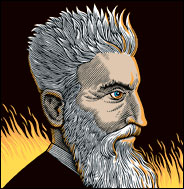Madman, terrorist, or crucial spark in the struggle to end slavery in the United States?

John Brown, illustrated by Gregory Nemec for the New York Times

The new book 'John Brown, Abolitionist': A Soldier in the Army of the Lord by David S. Reynolds was reviewed recently by Barbara Ehrenreich in the New York Times. The militant abolitionist John Brown is frequently dismissed as a crazy person or as a terrorist. David S. Reynolds takes a look at him in light of the times in which he lived:
In the 1850's, it was the pro-slavery forces that held a monopoly on armed force -- terrorizing antislavery citizens in the Midwest as well as the South, or proudly proclaiming, as did one Kansas newspaper editor, that he lived to kill an abolitionist: ''If I can't kill a man, I'll kill a woman; and if I can't kill a woman, I'll kill a child!'' Antislavery activists, on the other hand, were often pacifists and usually the victims of their political opponents -- a relationship symbolized by a South Carolina congressman's crippling beating of the abolitionist Charles Sumner on the floor of the United States Senate. With his guns and pikes, Brown reversed the equation -- stiffening the backbones of Northern abolitionists, terrifying the white South -- and hastening, through both effects, the Civil War and emancipation.According to the book,
... if terrorism is defined as the random killing of civilians to make a political point, then it is not just misleading to call Brown a terrorist, it is flat-out wrong. Brown selected his victims carefully; all had reportedly threatened abolitionists and the Brown family in particular.Grounds for further research...
The New York Times has an excerpt from the first chapter. [I don't know if this is a permanently available link.]
Here is another review of John Brown by Kathleen Krog in the Miami Herald.
God our security,
who alone can defend us
against the principalities and powers
that rule this present age;
may we trust in no weapons
except the whole armor of faith,
that in dying we may live,
and, having nothing, we may own the world,
through Jesus Christ. AMEN
--Janet Morley, All desires known, 1988
who alone can defend us
against the principalities and powers
that rule this present age;
may we trust in no weapons
except the whole armor of faith,
that in dying we may live,
and, having nothing, we may own the world,
through Jesus Christ. AMEN
--Janet Morley, All desires known, 1988
